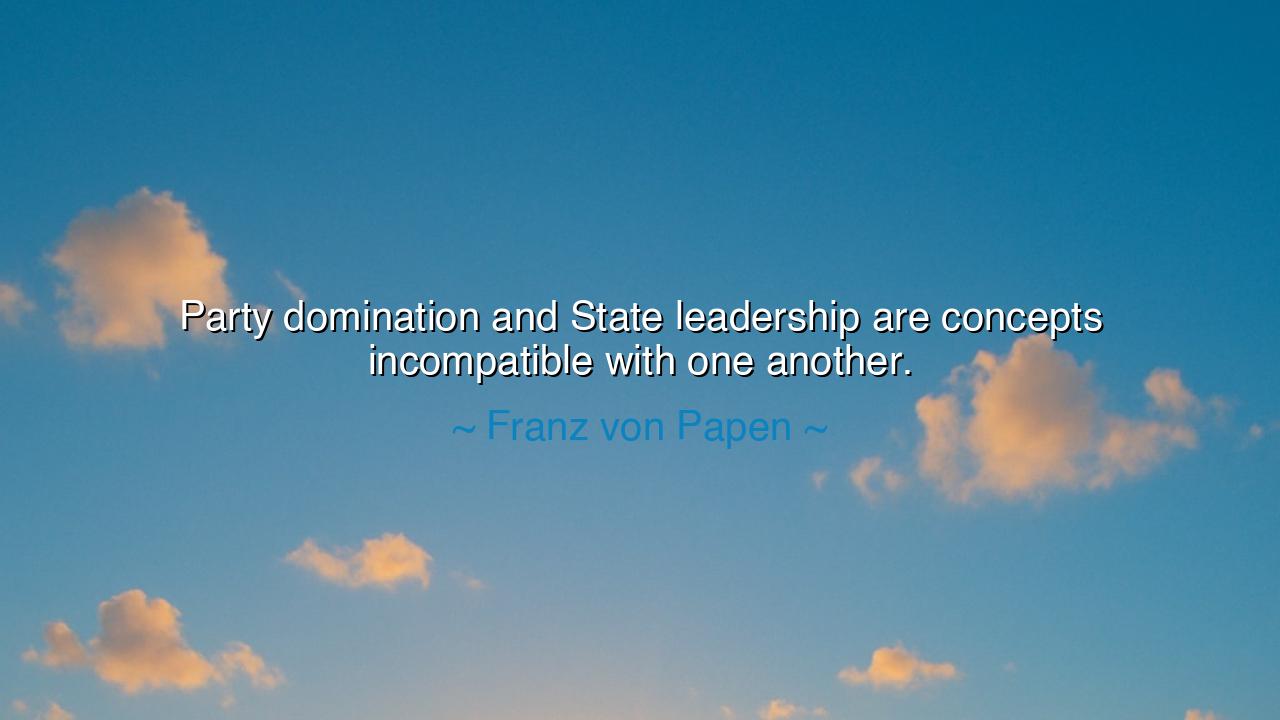
Party domination and State leadership are concepts incompatible






The words of Franz von Papen — “Party domination and State leadership are concepts incompatible with one another” — rise from one of the most tragic crossroads in human history, spoken by a man who witnessed his own nation fall into the abyss of tyranny. These words are not mere political commentary; they are a cry of warning, forged in the fires of experience. Von Papen, once Chancellor of Germany during the turbulent years preceding the Second World War, spoke from bitter hindsight. He had seen how a political party, born in fervor and fanaticism, could consume the machinery of the State, transforming a republic into a dictatorship. His statement, therefore, is not only political but moral — a timeless reminder that when loyalty to party eclipses loyalty to truth, justice, and the common good, the soul of a nation begins to die.
To understand the depth of this quote, one must see the world from which it emerged. In the years following the First World War, Germany was fractured, humiliated, and desperate. The people sought stability in a time of chaos, and thus power shifted easily between parties, each claiming to hold the key to salvation. In this storm, von Papen saw the rise of a force that would destroy them all — the total domination of the State by a single party, one that demanded obedience not to principle but to ideology. What began as political organization became religious dogma; what began as leadership became control. By the time he uttered these words, von Papen had learned the hard truth: that a party seeks victory, but a State must seek wisdom. When the two are made one, corruption, repression, and ruin inevitably follow.
The ancients, too, knew this danger. Plato, in his Republic, warned that democracy decays when the thirst for factional triumph outweighs the pursuit of justice. When citizens think not as members of a whole but as partisans, society fractures into camps of pride and vengeance. From such division arises the tyrant — the one who claims to speak for all but serves only himself. Von Papen’s insight is a continuation of this ancient wisdom: a State is sacred, built to serve all its people; a party, by nature, serves a portion of them. When the servant becomes the master, the people become divided, and the State becomes an instrument of oppression rather than order.
We can see this tragedy embodied in the story of Rome. Once a republic guided by senators and laws, it gradually fell under the grip of single-party ambition. The Populares and Optimates fought for dominance, each claiming to represent the will of Rome, but their warfare destroyed the very heart of the Republic. Out of that chaos rose Caesar — the embodiment of party victory turned to imperial domination. The lesson was eternal: when the power of one faction absorbs the power of the State, liberty perishes, and the citizen becomes a subject. Von Papen’s Germany would repeat this pattern in blood, and his words stand as a mourning prayer for what was lost.
Yet within this warning lies a call to balance — for no State can live without passion, nor can politics exist without conviction. Von Papen’s insight does not demand that we destroy parties, but that we remember their purpose. Political parties must be tools, not thrones; instruments of dialogue, not engines of domination. The health of a nation lies in its ability to let ideas contend freely while remembering that all must serve a higher ideal — the unity of the people and the dignity of the State. When debate becomes war and compromise becomes weakness, democracy sickens; but when reason governs passion, liberty endures.
In our modern age, von Papen’s words still echo. We live in times when partisanship once again threatens to eclipse statesmanship — when leaders act not as servants of all, but as warriors for their factions. We see nations polarized, truth weaponized, and governance reduced to spectacle. Yet history teaches that the fall of great civilizations begins not with invasion, but with internal division — when party loyalty outweighs national duty. The strength of a State lies in the integrity of its leaders, those who rise above ideology to serve the greater good.
The lesson, therefore, is this: let every citizen guard against the blindness of faction. Question not only your opponents, but yourself. Remember that the love of truth must be greater than the love of victory, and that unity built upon justice is stronger than unity built upon fear. For when a nation becomes enslaved to party domination, it loses the moral compass that guides its destiny. But when men and women lead with conscience rather than creed, the State becomes not an instrument of power, but a guardian of humanity.
Therefore, let us heed the wisdom of von Papen and the sorrow of his time. Let us be citizens before partisans, seekers of truth before servants of ideology. For as the ancients taught, the greatest empire is not the one ruled by might, but the one ruled by virtue. When the State serves all and no party rules alone, justice is preserved, and freedom — that fragile, holy flame — continues to burn for generations yet unborn.






AAdministratorAdministrator
Welcome, honored guests. Please leave a comment, we will respond soon